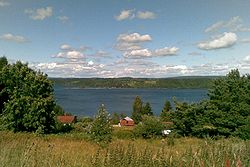Trøgstad Municipality
Trøgstad kommune | |
|---|---|
 | |
|
| |
 Østfold within Norway | |
 Trøgstad within Østfold | |
| Coordinates: 59°39′5″N 11°20′23″E / 59.65139°N 11.33972°E | |
| Country | Norway |
| County | Østfold |
| Administrative centre | Skjønhaug |
| Government | |
| • Mayor (2019) | Svend Saxe Frøshaug (Sp) |
| Area | |
• Total | 204 km2 (79 sq mi) |
| • Land | 188 km2 (73 sq mi) |
| • Rank | #328 in Norway |
| Population (2004) | |
• Total | 4,953 |
| • Rank | #193 in Norway |
| • Density | 284.646/km2 (737.23/sq mi) |
| • Change (10 years) | |
| Demonym | Trøgsting[1] |
| Official language | |
| • Norwegian form | Bokmål |
| Time zone | UTC+01:00 (CET) |
| • Summer (DST) | UTC+02:00 (CEST) |
| ISO 3166 code | NO-0122[3] |
| Website | Official website |
Trøgstad was a municipality in Østfold county, Norway. The administrative centre of the municipality was the village of Skjønhaug. The municipality included the parishes of Skjønhaug, Havnås and Båstad. The parish of Trygstad was established as a municipality on 1 January 1838 (see formannskapsdistrikt).
Trøgstad is now part of the municipality Indre Østfold.
The scene of the crime for the World War II-era Feldmann case is at Skrikerudtjernet in Trøgstad.
General information
Name
The municipality (originally the parish) is named after the old Trøgstad farm (Old Norse: Þrygsstaðir and/or Þrjúgsstaðir), since the first church was built here. The meaning of the first element is not known (maybe a male nickname) and the last element is staðir which means "homestead" or "farm". Prior to 1889, the name was written "Trygstad".
Coat-of-arms
The coat-of-arms is from modern times. They were granted on 24 August 1979. The arms show an anvil and was chosen because Trøgstad historically was well known for the quality of its blacksmiths who made iron tools and objects. The green background of the shield symbolizes the fields and forests in the municipality. The arms were designed by Truls Nygaard.[4][5] (See also coat-of-arms of Hol)

Trøgstad Church
Trøgstad Church (Trøgstad kirke) is a medieval era, stone church. It belongs to Østre Borgesyssel deanery in Diocese of Borg. The church is located on a ridge south of Øyeren. The church is of Romanesque architecture and has a rectangular nave with a lower and narrower choir.[6]
The church is probably built ca. 1250. It was the equipped with turret with a bell tower ca. 1620. This had to be demolished and replaced with a new tower in 1700. A sacristy was built by the choir's north face in 1697. In 1904 the church was extended and rebuilt, the western wall and the porch were demolished and choir was extended. After rebuilding the church has approximately 350 seats. [7]
Notable people
Minorities
| Ancestry | Number |
|---|---|
| 111 | |
| 104 | |
| 31 | |
| 31 | |
| 21 |
Sister cities
Trøgstad has the following sister cities:[9]
 Estonia - Kadrina, Lääne-Viru, Estonia
Estonia - Kadrina, Lääne-Viru, Estonia Finland - Kinnula, Länsi-Suomen lääni, Finland
Finland - Kinnula, Länsi-Suomen lääni, Finland Canada - Robertville, New Brunswick, Canada
Canada - Robertville, New Brunswick, Canada
References
- ^ "Navn på steder og personer: Innbyggjarnamn" (in Norwegian). Språkrådet.
- ^ "Forskrift om målvedtak i kommunar og fylkeskommunar" (in Norwegian). Lovdata.no.
- ^ Bolstad, Erik; Thorsnæs, Geir, eds. (2023-01-26). "Kommunenummer". Store norske leksikon (in Norwegian). Kunnskapsforlaget.
- ^ Norske Kommunevåpen (1990). "Nye kommunevåbener i Norden". Retrieved 2008-12-15.
- ^ "Trøgstads ommunevåpen" (in Norwegian). Trøgstads kommune. Archived from the original on 2011-07-24. Retrieved 2008-12-15.
- ^ "Østre Borgesyssel prosti". arkivportalen. Retrieved October 1, 2016.
- ^ Sigrid Marie Christie, Håkon Christie. "Trøgstad kirke". Norges Kirker. Retrieved October 1, 2016.
- ^ "Immigrants and Norwegian-born to immigrant parents, by immigration category, country background and percentages of the population". ssb.no. Retrieved 24 June 2017.
- ^ "Vennskapskommuner" (in Norwegian). Trøgstad kommune. Archived from the original on 2011-07-24. Retrieved 2008-12-15.
External links
 Media related to Trøgstad at Wikimedia Commons
Media related to Trøgstad at Wikimedia Commons The dictionary definition of Spydeberg at Wiktionary
The dictionary definition of Spydeberg at Wiktionary- Municipal fact sheet from Statistics Norway
 Østfold travel guide from Wikivoyage
Østfold travel guide from Wikivoyage











